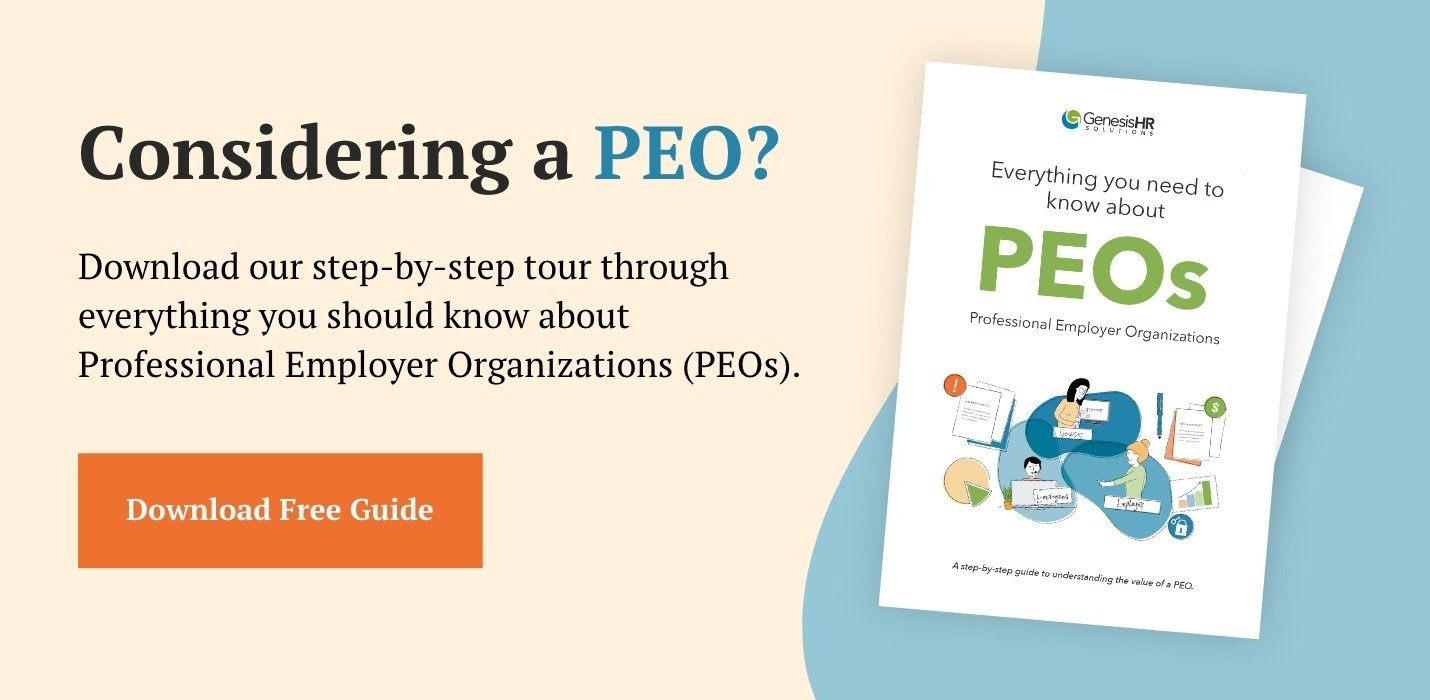There are several factors to think about once you’ve established a business regarding the complexities of payroll. Questions around how payroll relates to hiring and managing employees, payroll, benefits, taxes and workers compensation are all important to consider. In this article, we’re focusing specifically on what you need to know in order to manage payroll correctly.
1. Before you begin hiring, apply for an Employer Identification Number (EIN).
Commonly referred to as an EIN or federal EIN, this is a number issued by the IRS for tax administration purposes. The EIN will be used in your business filings to identify your company. Obtaining an EIN is easy, and you can apply for it on the IRS website.
2. Determine the states where you will be doing business and/or hiring.
In addition to obtaining a federal EIN, you may have to register your business in your state and get a state ID number. This number will be used when you pay state income tax, withholding, and employment taxes. Note that there are several states that have no state income tax; however, even in those states, you will need to apply for unemployment insurance accounts. All businesses need to apply for a state ID for unemployment. While under a PEO, there are several states that will confirm the PEO’s state ID number upon filing and paying.
3. Determine your payroll schedule.
You can choose to pay your employees on a weekly, biweekly, sometimes semi-monthly, or monthly basis depending on your state’s requirements. States also have minimum requirements regarding pay frequencies. You can confirm your state’s requirements by visiting your state’s Department of Labor website.
Approved Payroll Frequencies
| Weekly | 52 times per year |
| Bi-weekly | 26 times per year |
| Semi-monthly | 24 times per year |
| Monthly | 12 times per year |
Pay Requirements By State
| State | Weekly | Bi-weekly | Semi-monthly | Monthly |
|---|---|---|---|---|
| Alaska | X | X | ||
| Arizona | X3 | |||
| Arkansas | X | |||
| California | X9 | X9 | X | |
| Colorado | X | |||
| Connecticut | X4 | |||
| Delaware | X | |||
| District of Columbia | X | |||
| Georgia | X | |||
| Hawaii | X | X5 | ||
| Idaho | X | |||
| Illinois | X | X2 | ||
| Indiana | X | X | ||
| Iowa | X | X6 | X | X |
| Kansas | X | |||
| Kentucky | X | |||
| Louisiana | X | X7 | ||
| Maine | X8 | |||
| Maryland | X | X | ||
| Massachusetts | X | X | ||
| Michigan 9 | X | X | X | X |
| Minnesota | X10 | X10 | ||
| Mississippi | X11 | X11 | ||
| Missouri | X | |||
| Montana12 | ||||
| Nebraska 13 | ||||
| Nevada | X | X2 | ||
| New Hampshire | X | |||
| New Jersey | X | X21 | ||
| New Mexico | X | X2 | ||
| New York | X14 | X14 | ||
| North Carolina 15 | ||||
| North Dakota | X | |||
| Ohio | X | |||
| Oklahoma | X | |||
| Oregon | X | |||
| Pennsylvania 13 | ||||
| Rhode Island | X 16 | X 16 | X 16 | |
| South Dakota | X | |||
| Tennessee | X | |||
| Texas | X | X17 | ||
| Utah | X18 | X18 | ||
| Vermont | X | X19 | X19 | |
| Virginia | X 20 | X20 | X2 | |
| Washington | X | |||
| West Virginia | X | |||
| Wisconsin | X | |||
| Wyoming | X |
Note: No regulations or not specified for Alabama and South Carolina.
Tip: If you have all salaried exempt employees and are considering choosing a semi-monthly pay cycle, it would be wise to consider your future hiring needs. Many states, Massachusetts included, require hourly employees to be paid on a weekly or biweekly basis. It is much easier to start off on a biweekly pay cycle than having to change from semi-monthly to biweekly after the fact.
This type of change can be viewed as disruptive to your existing workforce. If you find yourself in this situation you can always add an additional pay cycle to your schedule for your hourly employees, however, that strategy will create a lot of unnecessary work.
4. Stay updated on all state and federal tax laws.
Employers need to stay on top of the ever-changing tax rules and regulations with regard to state and federal reporting requirements. Hiring remote employees, who may be located in different states, can make this an extremely daunting task. Remember it is the employer’s responsibility to gather and update compliance information. (This is one of the areas where having a PEO partner like GenesisHR comes in handy—we stay on top of the legislation and regulation updates for you!)
5. Complete onboarding paperwork on time.
Make sure you as the employer and your new hires complete all the employment forms you are legally required to submit. These forms will provide you with new hire data so that you properly classify and compensate employees. Rules may differ based on your locality, so make sure you check federal, state, and county websites for all paperwork and deadlines.
The most common types of employment forms employers are expected to complete are:
- W-4 Form & State Withholding Form if applicable
- I-9 Employment Eligibility Verification Form
- Direct Deposit Form
6. Obtain worker’s compensation coverage.
Many, but not all, states require businesses to carry worker’s compensation insurance. For example, employers operating in Massachusetts are required to carry workers’ compensation insurance for their employees and themselves, if they are an employee of their company. At GenesisHR, we provide worker’s compensation coverage for all clients that join our platform.
7. Automate or outsource your payroll.
One of the most valuable suggestions I can give for managing payroll is to consider outsourcing it. Why deal with the headaches of managing payroll in-house when you can outsource it to GenesisHR Solutions?
We are a professional employer organization (PEO) that acts as the employer of record for payroll and tax purposes. If you want to guarantee precise payroll and tax administration and accurate payroll taxes—all performed in a timely manner—getting in touch with GenesisHR is your first step. Beyond payroll, our PEO offers a variety of other HR solutions, from performance management to HR policies and practices to compliance, benefits, 401(k) plans, and more! Contact us today to learn more about what we do and how we can help you.





